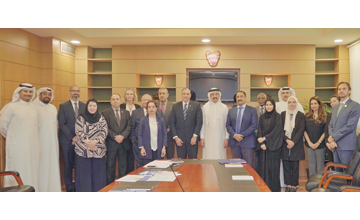ID :
493017
Tue, 05/22/2018 - 03:42
Auther :
Shortlink :
https://www.oananews.org//node/493017
The shortlink copeid
Bahrain chairs meeting with UN

Manama, May 21 (BNA): The Undersecretary for International Affairs of the Ministry of Foreign Affairs, Dr. Shaikh Abdulla bin Ahmed Al Khalifa, chaired today the meeting of the follow-up and coordination committee between the Government of the Kingdom of Bahrain and the resident and regional United Nations agencies, in the presence of the United Nations Resident Coordinator and UNDP Resident Representative to the Kingdom of Bahrain, Amin El Sharkawi, with the membership of representatives from the Ministry of Cabinet Affairs and the Office of the First Deputy Prime Minister.
The Undersecretary welcomed the participants to the Kingdom of Bahrain, noting the importance of the meeting as the first of its kind as it includes 16 representatives of the United Nations resident and regional agencies, in implementation of the strategic partnership framework document 2018-2020 signed on 24, October 2017, with the aim of strengthening the existing cooperation between the Kingdom of Bahrain and the United Nations, supporting the implementation of the Government's plan of action and priorities and the Economic Vision 2030, in line with the implementation of sustainable development goals 2030, and in accordance with the principles of sustainability, competitiveness and justice, as well as the prevention of duplication of initiatives and projects to optimize utilization with rationalization and reduction of spending, thus enhancing the progress of the Kingdom of Bahrain under the leadership of His Majesty King Hamad bin Isa Al Khalifa.
Dr. Shaikh Abdulla expressed the hope that the Kingdom of Bahrain, through its cooperation with United Nations agencies and through the unique strategic partnership framework in the region, will find creative mechanisms through various programs and initiatives to develop ongoing and future cooperation opportunities between the Government of the Kingdom and UN agencies, and to achieve transparency between the two sides, stressing in this regard the importance of the international reports reflecting the efforts and achievements of the Kingdom, affirming that the Kingdom of Bahrain has full confidence in its quality capabilities and its pioneering achievements.
The Undersecretary for International Affairs noted that the priority of the Committee's work will be to support the objectives of sustainable development and to focus on national concerns, foremost of which is investing in the human element and strengthening the institutional capacities, which are supported and motivated by advanced initiatives to take into account the needs and satisfaction of citizens, in accordance with the highest international standards.
Dr. Shaikh Abdulla discussed a number of important areas of current and future cooperation with the United Nations, such as promoting sustainable economic growth, improving the level of infrastructure, expanding the use of renewable energy resources, building a map of new investments and entrepreneurship, strengthening statistical and informational capacities, as well as advanced training programs, human development and others.
The United Nations Resident Coordinator said that the framework of the strategic partnership symbolizes a very important achievement in the relationship between the Kingdom of Bahrain and the United Nations, thanking the Government of the Kingdom and the United Nations agencies for their tireless efforts to produce the strategic partnership framework, which was an unprecedented step in the region, leading to the development and implementation of initiatives and projects that serve the Kingdom of Bahrain, affirming his confidence that the Committee will follow up on the implementation of projects and achieve the desired goals.
The UN Resident Coordinator added that one of the elements of the United Nations reform plan was to encourage Member States and United Nations offices in each country to develop national partnership mechanisms that set priorities for action, cooperation and technical matters, noting that the establishment of effective coordination mechanisms was already taking place in the Kingdom of Bahrain, expressing his confidence that the strategic partnership framework will indeed help contribute to this.
Representatives of the UN agencies reviewed and discussed a number of initiatives and projects that have already been implemented in cooperation with their partners in the Kingdom of Bahrain, as well as the projects being implemented, and future initiatives appropriate to the needs of the Kingdom of Bahrain, identifying lessons learned and best practices to serve the Kingdom in the coming years.
In addition, the participants discussed the most important events and activities to be held in the Kingdom of Bahrain by these agencies, the Representatives of the agencies affirmed the importance of coordination with the Government of the Kingdom through this Committee to facilitate all procedures and requirements.
The follow-up and coordination committee between the Government of the Kingdom of Bahrain and the resident and regional United Nations agencies was established by the Cabinet of Ministers at a meeting held on 23, November 2017, where the Ministry of Foreign Affairs was appointed the Chairmanship of the Committee.
The Committee is responsible for following up on the implementation of proposed projects and initiatives between government agencies and resident and regional United Nations agencies and bodies, to ensure alignment with the Government's work program, the economic vision of the Kingdom of Bahrain 2030, and the availability of the necessary funds and not duplicating projects.
The United Nations agencies that participated in the meeting were the United Nations Human Settlements Program, the World Meteorological Organization, the United Nations Children's Fund, the Economic and Social Commission for Western Asia (ESCWA), the International Labor Organization (ILO), the United Nations Office on Drugs and Crime, the United Nations Educational, Scientific and Cultural Organization, the Office of the United Nations High Commissioner for Refugees, the United Nations Development Program, the United Nations Environment Program, the United Nations Office for Gender Equality and the Empowerment of Women, the United Nations Population Fund, the International Atomic Energy Agency, the International Organization for Migration and the United Nations Information Centres.





